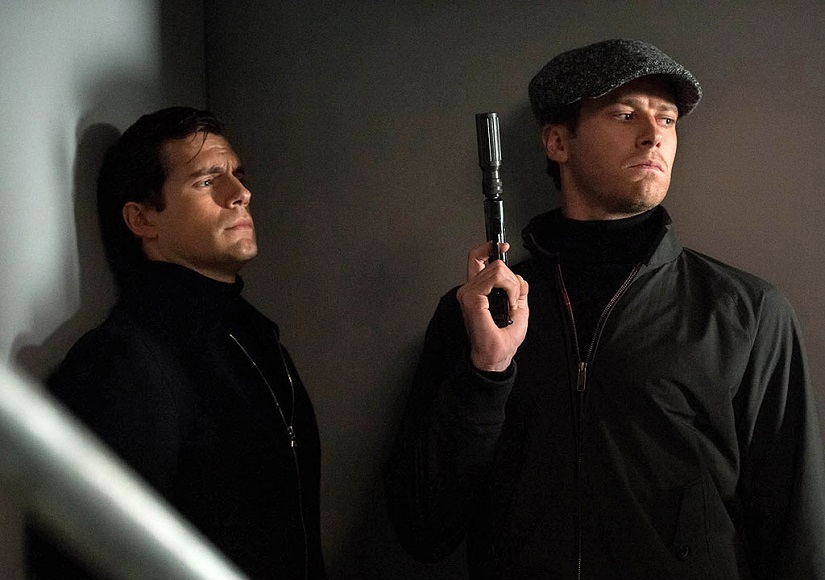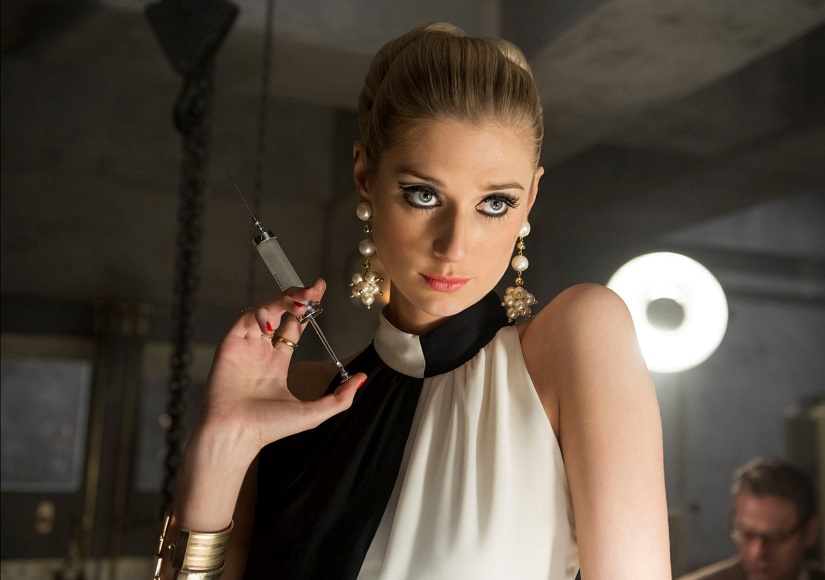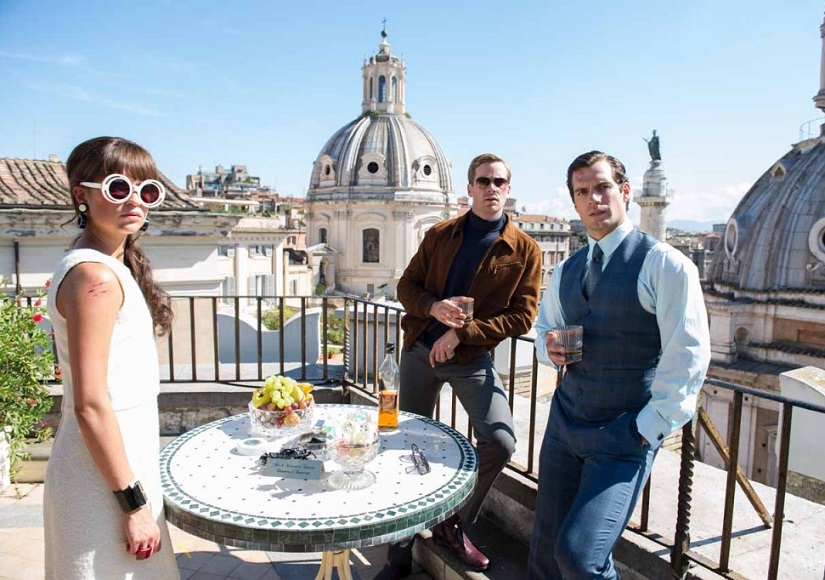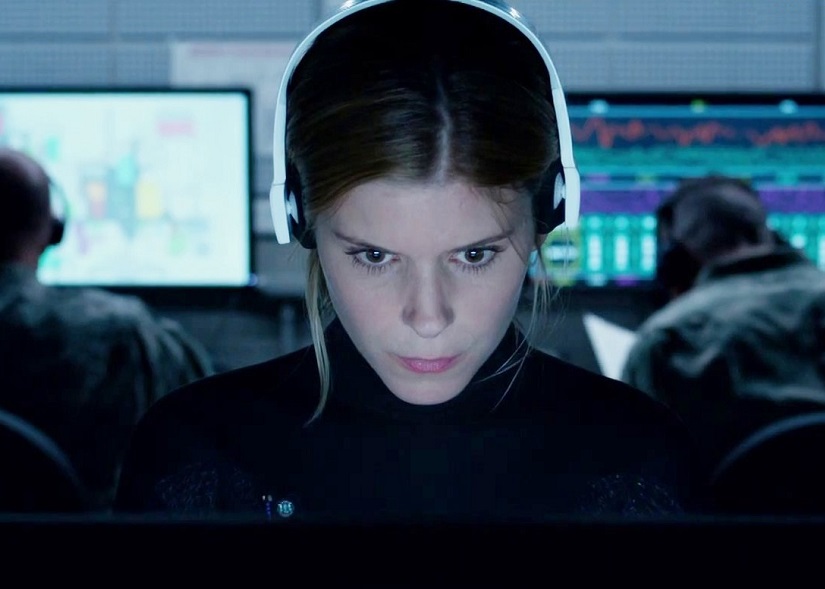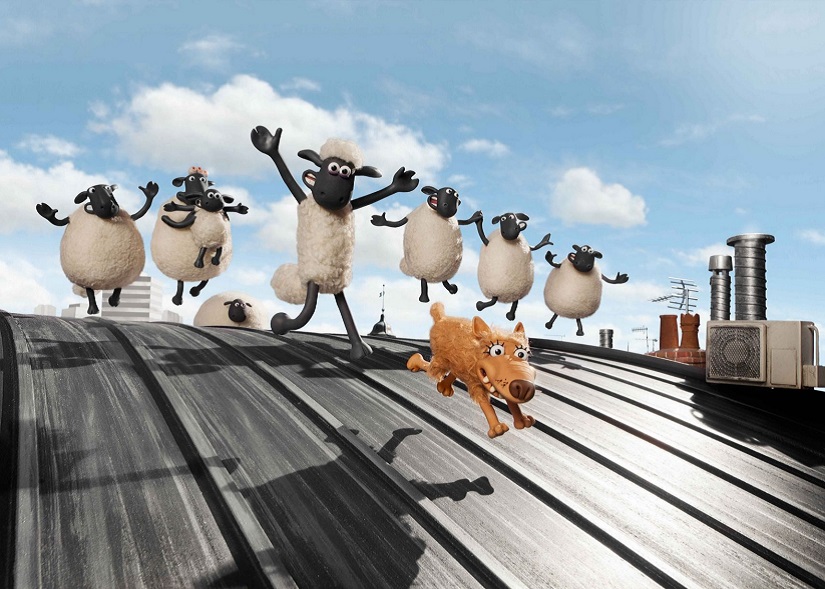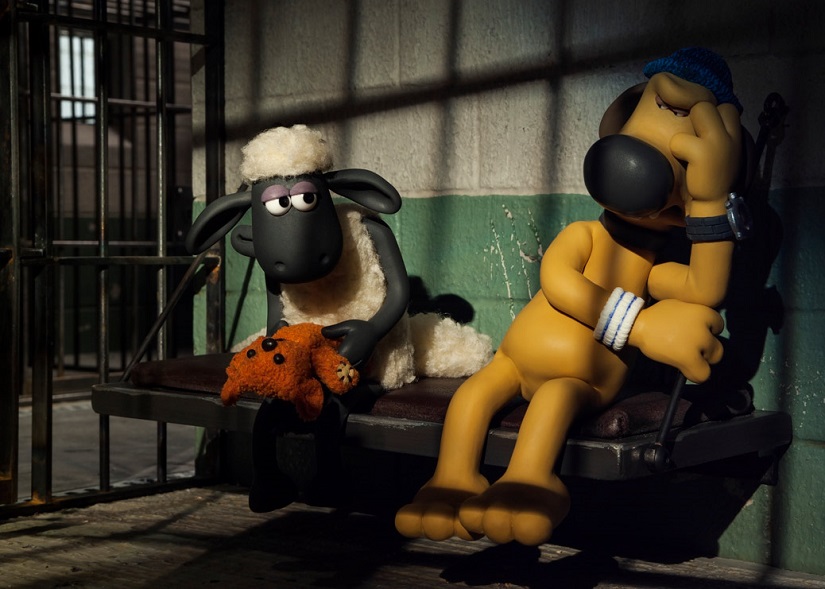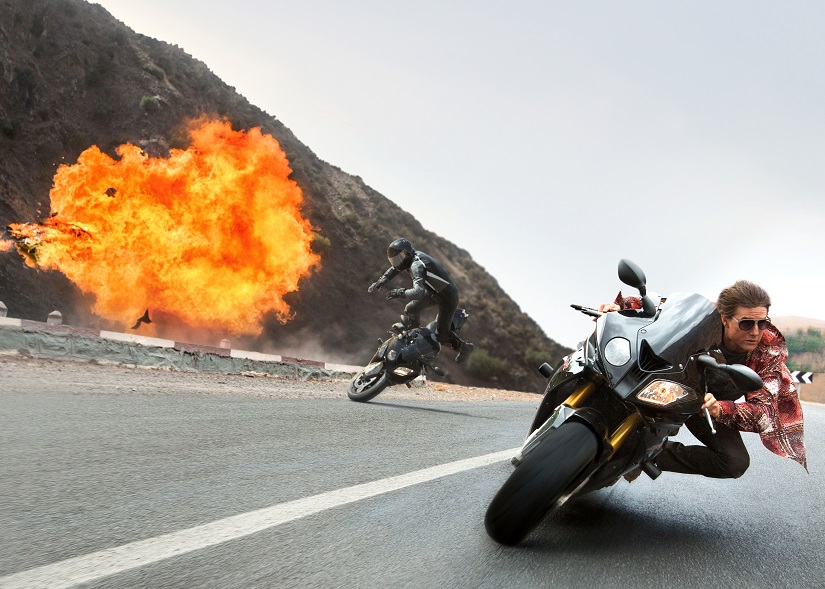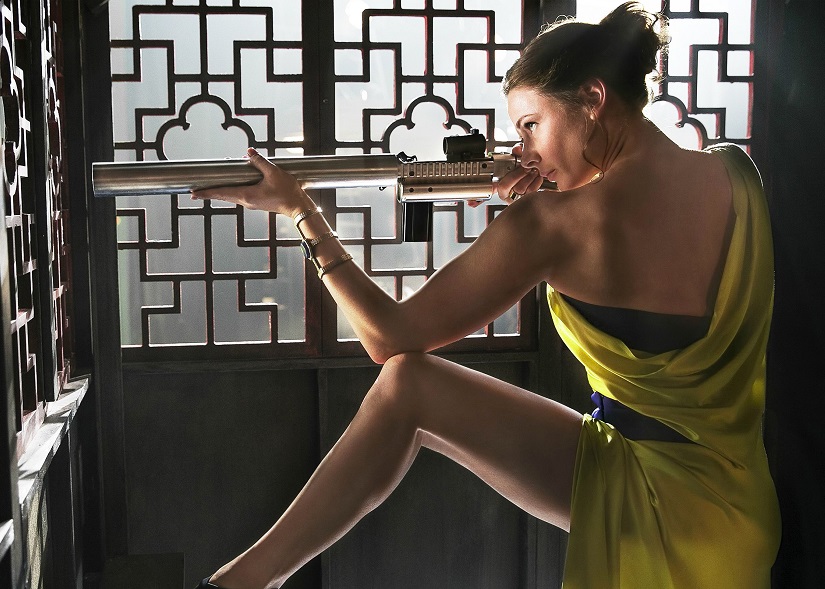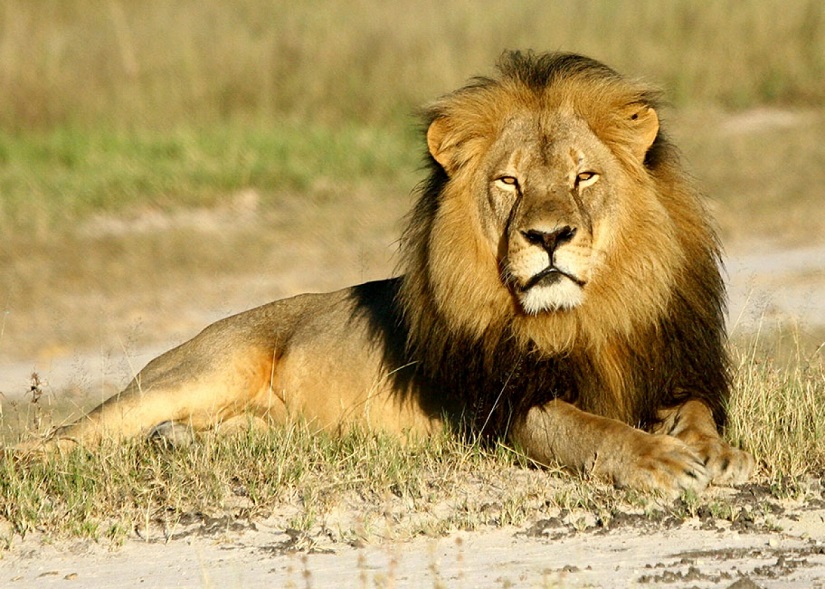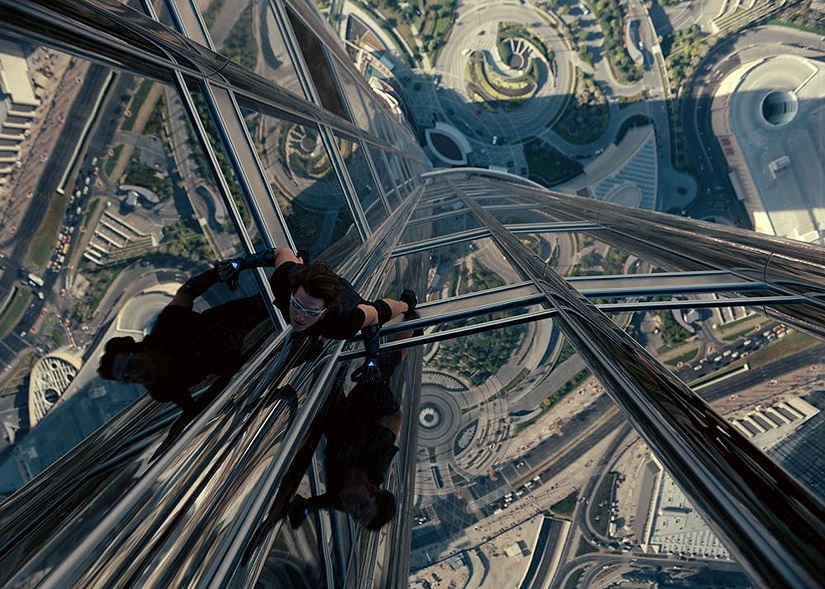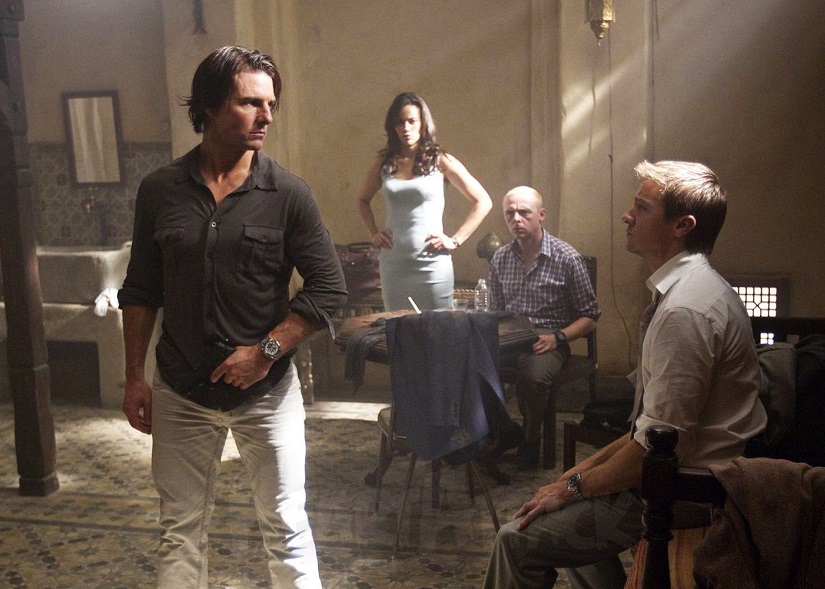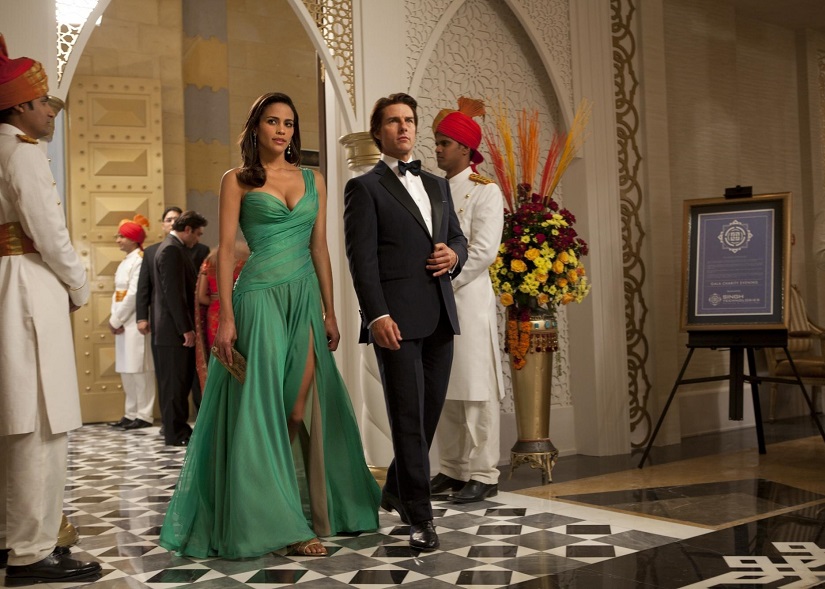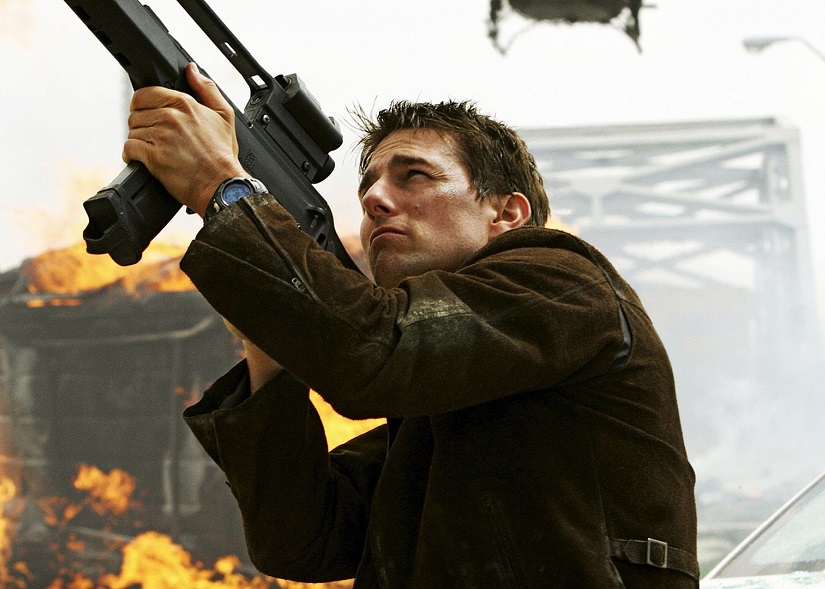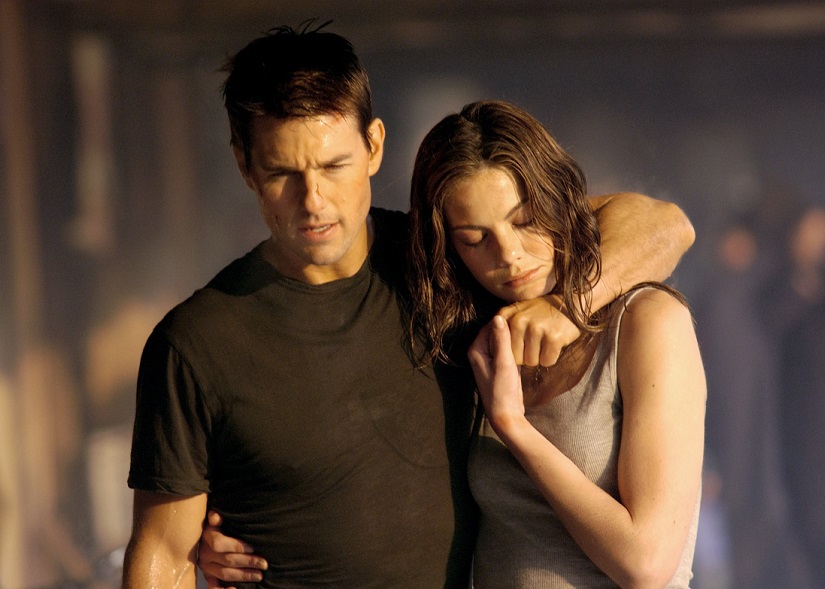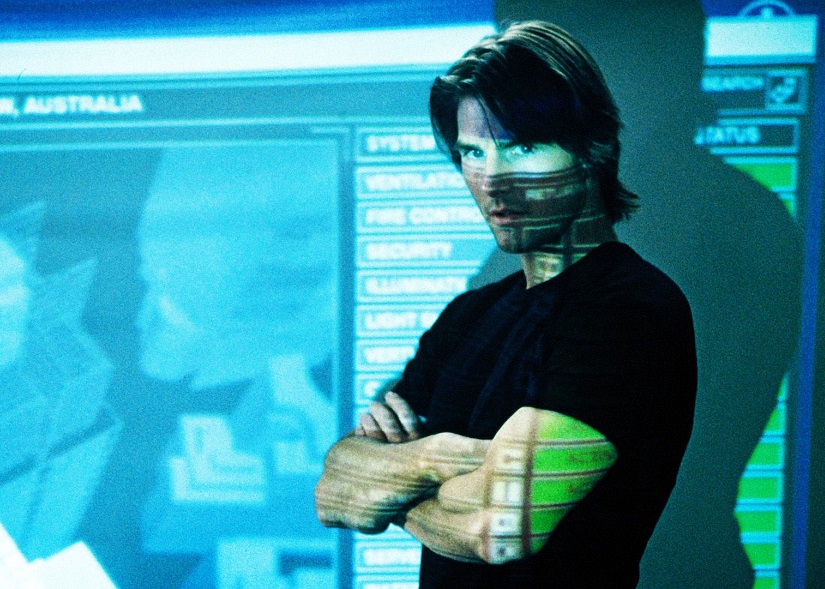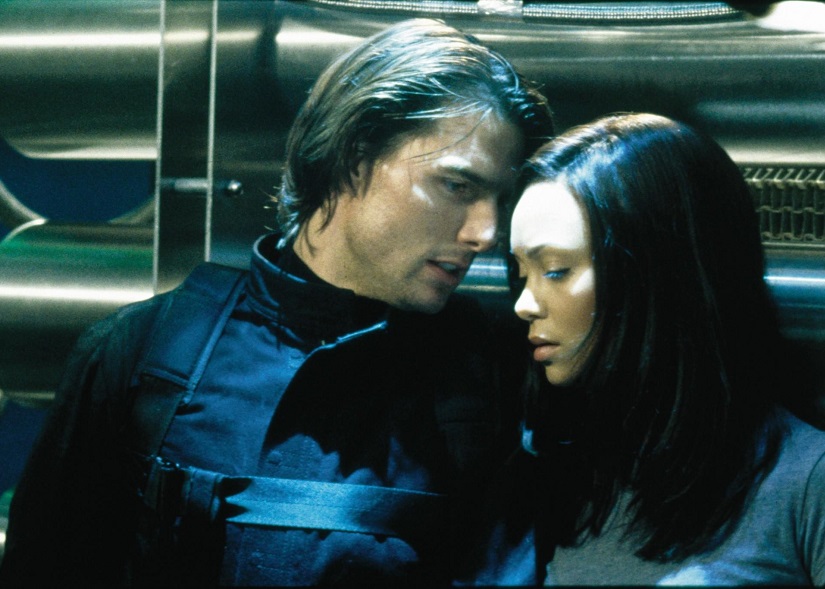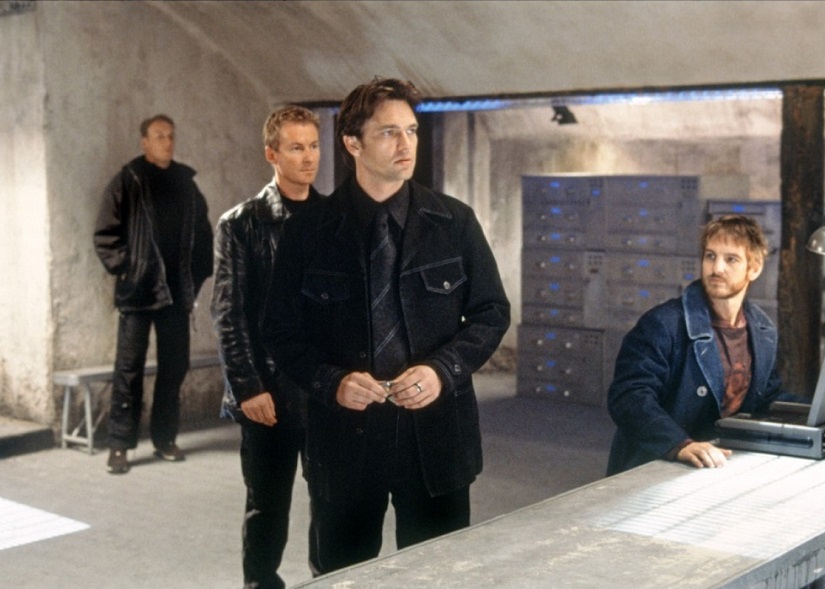[Review] The Man From U.N.C.L.E.
I'm not sure how many people remember the original Man From UNCLE, which isn't much of a surprise since it was a fairly light and silly series to begin with, but I adored it growing up. The cast was terrific and it delivered a consistent stream of fluffily enjoyable spy shenanigans, finding a comfortable middle ground between the loopiness of latter era Avengers and the outright comedy of Get Smart. It made stars out of Robert Vaughan, who played debonair cool to the hilt as Napoleon Solo, a character unsurprisingly named by Bond creator Ian Fleming, and David McCallum, who brought mystery and aloof cool to his more intellectual Soviet partner, Illya Kuryakin. Light and silly is by no means a bad thing.
I doubt it'll make any difference to 99% of the people watching, but Guy Ritchie's big screen interpretation captures the tone of the series perfectly. His U.N.C.L.E. is a caper from beginning to end, light on its feet, funny all the way through and anchored by charismatic performances across the board, most notably from Henry Cavill. That it doesn't quite fully satisfy is down to the movie also carrying over the series' flippancy when it came to plot, which here only really serves to contextualise its set-pieces and sight gags. It stays on the right side of the line between being light and being in danger of floating away, but it's a style over substance affair which works best as a short and sweet dessert to the summer's meatier blockbusters than as a full meal in its own right.
[youtube id="CzYRlISYE8Y"]
The Man From U.N.C.L.E.
Director: Guy Ritchie
Rating: PG-13
Release Date: August 14th, 2015
What little plot there is sees the CIA and KGB team up after a former Nazi scientist goes missing and is believed to be in the process of constructing a nuclear bomb for an unknown organisation overseen by Victoria Vinciguerra (Elizabeth Debicki). American agent Solo (Henry Cavill) and Soviet agent Kuryakin (Armie Hammer) are partnered and sent into the field with the scientist's estranged daughter, Gaby (Alicia Vikander), to track him down. It's essentially the plot of every post-Thunderball Cold War spy movie ever, and that Bond movie even gets a nod courtesy of both movies featuring a supporting character called Count Lippe. Writers Ritchie and Lionel Wigram have little to no interest in subverting the established form or the politics of the situation in any way, choosing instead, not unjustifiably, to focus on giving the core cast plenty of opportunities to bounce off each other and look fabulous doing it.
The undeniable star of the show is Cavill, who gets Robert Vaughan's exaggerated smoothness spot-on without resorting to lazy imitation. His Solo is charm personified, never flustered or anything less than immaculately tailored and quip-ready in any given situation. The fact he's built like Arnold Schwarzenegger is somewhat distracting - no-one in the '60s, even bodybuilders, had his body shape - but easily overlooked when he's such an enjoyable screen presence. Alicia Vikander is given less to do as Gaby, who suffers for being the pivot point of a narrative the movie barely seems interested in, but her sweetness and humour shine through and she's quite adorable dancing in her pyjamas and rocking day-glo mod fashions. While villainess Victoria Vinciguerra is similarly undercooked on the page, Elizabeth Debicki amps up the aristocrat detachment to winning effect. If she's difficult to take seriously as the movie's big bad, it's by no means down to Debicki's performance, but rather the movie surrounding her with a glut of other potential villains who never amount to anything other than drawing attention away from where it deserves to be.
Last but not least is Armie Hammer's Illya Kuryakin, whose constantly livid Soviet bluster makes a wonderful foil for Cavill's über-cool Solo, even if the character is the polar opposite of the series' cultured intellectual. As mentioned, I doubt enough people will remember the series for it to be an issue, but as a fan, it's a little disappointing to see Kuryakin reduced to a somewhat one-dimensional brute, mostly for the purposes of providing Solo with someone to direct his droll one-liners at. This Kuryakin is more or less your stereotypical Ivan Drago Soviet, all punching power and little brainpower, where the original was more nuanced and shaded, inspired by the reserved but honourable manner of many great characters from Russian literature. Armie Hammer, himself of Russian descent, is nevertheless very funny and gives the character plenty of integrity, striking up an endearing game of one-upsmanship with Solo.
The movie's internationalism manifests in both the casting - which features an Australian playing a Brit, two Brits playing American, an American playing a Russian, a Swede playing a German, and seemingly only a very droll Hugh Grant playing his own nationality, probably because he can't do anything else- and Daniel Pemberton's glorious score, which blends Western-influenced themes for Solo (nicknamed 'Cowboy') with more subtle Russian influences for Kuryakin, mixed into a grand cocktail of '60s breeziness. Ritchie's direction is similarly spry, though while his heavily stylised approach makes the most of the movie's caper-ish qualities and its character interactions, his frivolity leaves the action sequences feeling weightless and inconsequential, particularly a late game assault on Vinciguerra's island base (what else?) delivered through split-screen shorthand.
Still, there's a great deal to like and while the movie permits itself to leave the option open for many sequels to come - whether they will actually happen remains to be seen, as movies this strongly stylised have rarely gone on to be viable starting points for franchises - it functions perfectly satisfactorily as a self-contained experience in its own right. It's a welcome change from the myriad blockbusters seemingly more intent on selling you on movies yet to happen than offering anything worthwhile in the here and now. As is the case with all modern movies set in the '60s, the period trappings are far too busy and trying far too hard to actually resemble anything released in the actual '60s, but they do give the movie an identity and reality it can call its own.
Coming in at a shade under two hours, it slightly overstays its welcome and runs out of steam on its last leg - an off-road chase sequence feels lifted from a completely different, lesser movie - with an ending that is nothing if not abrupt and fails to give the required impact to the feature-long build up to the lead characters finally coming together under the eponymous mantle. However, should the box office come through, I'd be delighted to watch plenty more of these. It's to Ritchie's great credit that he eschews the usual lineup of tired buzzword qualities - dark, gritty, epic - in favour of one more altogther underrated: fun. Go in expecting nothing more consequential than a good time and a few laughs and UNCLE serves up an ideal end-of-summer palate cleanser.
[Review] Fantastic Four
The name Fantastic Four suggests a certain joie de vivre, a delight in its own comic book silliness. When Marvel's first family were translated to the big screen by Tim Story in 2005, and again for a 2007 sequel, that lightness of touch unfortunately slipped into kitschy smugness, with the excessive focus on camp humour sucking the characters dry of believeable humanity. As oversaturated as the blockbuster movie scene has become with reboots and reimaginings, Fantastic Four presented a worthwhile opportunity for Fox to do right by the characters with the same balance of wit and sincerity which made Joss Whedon's first attempt at The Avengers such a rousing success.
Unfortunately, the studio decided that rather than going for a balanced approach, they would instead push to the opposite extreme, banishing all joy and warmth in favour of something closer in tone to Christopher Nolan's Batman movies. It doesn't take much of a comic book fan to point out that Batman and Fantastic Four couldn't really have much less in common, unless one were to look back to the Bat's loopy silver age incarnation at a stretch (no pun intended, Mister Fantastic). Consequently, this latest Fantastic Four is a movie perpetually at war with itself, unable to reconcile the fun suggested by its title and its characters with the miserable tone the writers inflict upon them.
[youtube id="AAgnQdiZFsQ"]
Fantastic Four
Director: Josh Trank
Rating: PG-13
Release Date: August 7th, 2015
The movie is an origin story to the extent that few movies have been origin stories before. Tim Story's 2005 version pushed through the core character dynamics and roots of the Four's powers in about twenty minutes before starting towards the main smackdown with Doctor Doom. Trank's version dedicates virtually the entire movie to setting the stage for how the characters get their powers and eventually come to terms with them, leaving the ultimate showdown - more or less the only real action sequence - squished into what amounts to little more than ten minutes at the end. In fact, Toby Kebbell's Victor probably gets no more than fifteen minutes' total screentime, with his introduction every bit as rushed as his exit. Considering Doom is supposed to be one of Marvel's most fearsome and complex villains, we're offered little sense of the character beyond a dash of petulance and hints at unrequited feelings for Kate Mara's Sue. Of such meagre ingredients are great supervillains not made.
What we're left with for the remaining 80-odd minutes is a tedious and mostly plotless trawl through a series of events telegraphed so blatantly that even those not spoilt by the trailer or arriving with any knowledge of the comics will have a clear idea where it's heading. It might have worked as a character piece had the characters been given any greater definition than the cursory outlines on show. Reed Richards is the clever one. Johnny Storm is, boom boom, the hotheaded rebel. Sue is, um, a less brilliant version of Reed, with a weird fascination with musical patterns that exists for no other reason than to give her a single, lazily-written scene she can call her own around the midpoint. Ben is Reed's best friend and a bit angsty. Only Reed and Ben give off the faintest sense of humanity, mostly because the movie gives their friendship a little backstory. As for Reed and Sue, they spend what little time they have together making snide comments and being annoyed with each other... so maybe a perfect set-up for a married couple after all.
The script offers nothing to the reasonably talented cast, who flounder trying to create any semblance of chemistry. This is in no small part down to them spending so little time together as a foursome, to the extent that there's little reason to believe Ben has even met Sue until the very end. The familial relationship between the Four is often cited as what makes their superhero team different from others, yet the movie goes to great lengths to keep them apart. Ben departs the story once Reed joins the Baxter foundation, only returning when Reed drunk dials him (not joking) to come along with him, Johnny and Victor on an unsanctioned first journey in their pan-dimensional travel machine, leaving Sue behind. When they return, Victor abandoned, the four are segregated all the way through to the climax, at which point Reed starts talking about the importance of working together even though, as far as viewers are concerned, it seems as though they barely know each other.
The first half of the movie is significantly better than the second - a glimpse of an N64 controller is maybe the highlight of the entire thing - at least feeling as though it is building towards something even if it's patently obvious what that something is. Everything thereafter descends into a disorganised shambles, hitting one or two solid grace notes - an emphasis on the horror of each character's condition is well-played, and Doom's first demonstration of his vaguely defined powers is appreciably nasty, even if the movie has to subsequently forget them to stop him winning too easily - but otherwise spending a lot of time on entirely disposable training montages and grumbles about distrustful governments before hurrying the finale. The CGI is uniformly abysmal, particularly when it comes to Johnny's weightless human torch mode (which seems to cast little to no light or heat in several instances), Doom's melted action figure excuse for a face mask and the Thing, trouserless and dickless throughout, barely matching his mouth movements to his speech.
Its present 9% score on Rotten Tomatoes, lower than Jonah Hex, The Spirit and League Of Extraordinary Gentlemen, puts it among company whose badness is at least interesting, whereas Fantastic Four is merely dull, disjointed and dispiriting. Production troubles may have taken their toll, but it's hard to credit director Josh Trank's claim that his first cut was 'fantastic' when there's so little here that even hints at competence. It's a movie which roots the Thing's catchphrase in childhood abuse suffered at the hands of his older brother, which should tell you all you need to know. Fantastic Four is a series of compounding misjudgments, resulting in a movie ashamed of its own identity and straining to capture a zeitgeist long since passed. At least half the title is honest. It may not be fantastic, but is a 4/10 movie through and through.
[Review] Shaun The Sheep Movie
This review is being re-posted to coincide with its U.S. release.
Aardman's wonderful plasticine productions have never worked quite as well in the cinema as they do on television. In part that's because their television work includes the immaculate The Wrong Trousers, arguably the most perfectly paced and ambitiously staged animated shorts ever produced. And that's to say nothing of the animated trousers, boom boom. Transitioning to the big screen has meant stretching out half-hour plots to feature length, which works against Aardman's strength for creating small, self-contained pieces packed to the brim with exquisite visual punnery and telling stories more through animation than plotting. Chicken Run and Pirates! In An Adventure With Scientist both suffered from meandering stretches, offering enough visual wonder to make a wonderful trailer but not quite so capable at filling in the bits inbetween. Wallace & Gromit: The Curse Of The Were-Rabbit remains their finest cinematic outing to date, in no small part down to the studio's practiced expertise at setting out the rhythms of a story featuring their signature creations and laser-focus on spoofing one specific genre rather than firing in all directions and hoping for a hit.
Shaun The Sheep Movie (not, for whatever reason, Shaun The Sheep: The Movie, but I digress) also derives from one of Aardman's television hits, itself an offshoot of the Wallace & Gromit empire - specifically, the sheep from A Close Shave. The show is aimed at a noticeably younger audience than Wallace and the same is true of the movie. When a movie is classified 'for all ages', generally you can expect it to be aimed at children from, say, 6-12 years old. Shaun is the rare movie which skews even younger, though thanks to Aardman's gift for universal humour and soul-enriching animation, it is more than happy to whisk you back to the halcyon days of childhood even if you find yourself a few decades above the age requirements.
[youtube id="tQvwiOWpj7o"]
Shaun the Sheep Movie
Directors: Richard Starzak and Mark Burton
Rating: G
Release Date: February 6, 2015 (UK)
Growing out of the same formula which guides each of the 7-minute TV show episodes, the movie sees Shaun and his flock eager from a day off from their usual routine and having to escape the watchful eye of their farmer (called, ambitiously, 'Farmer') and his dog, Bitzer. On this occasion, events go a little more awry than expected and Farmer contrives to end up asleep in an out-of-control caravan that takes him to the Big City, where a bump on the head leads to him contracting amnesia and believing himself a celebrity hairdresser. With no-one to feed or look after them, and some naughty pigs wrecking havoc inside the farmhouse, the flock decides to go and get Farmer back, having to avoid the city's devious Animal Containment officer along the way.
As is probably clear from that description, the plot is not especially tight and the usual Aardman problems in maintaining pace apply. Between a number of truly inspired skits where the sheep try to blend into city life, the movie largely grinds to a halt whenever the Farmer becomes the focus. This shortcoming was made especially clear by a child in the row in front of me, who was enraptured every time the sheep took to the screen but quickly became distracted whenever the altogether less fluffy humans took their turn. Turns out no-one can deliver trenchant film criticism like a disinterested toddler.
Fortunately, the sheep sections are more than strong enough to make up for those shortcomings and as you'd expect from Aardman, there is no shortage of wonderfully staged slapstick set-pieces on offer. The flock's infiltration of an upmarket restaurant, dressed in poorly matched clothing from a local charity shop, is an absolute joy as the sheep attempt to blend in by imitating the etiquette of their fellow diners. A scene at a junkyard where the sheep serenade Timmy the lamb into feeling better is funny enough until you realise they've formed a baaa-bershop quartet, a detail so immaculate and quietly played you'd be quite forgiven for bursting out into spontaneous applause.
Aardman excel in such details and while it's disappointing to see the city's shops so generically signed ('Butcher', 'Newsagent', etc) considering how much fun can usually be had from picking out the background puns in the Wallace pictures, there's plenty of visual wit to enjoy in the foreground: the Animal Containment officer is brilliantly characterised in a short scene involving him posing in front of a mirror, while a brief stint inside a prison manages to imbue every one of its animal inmates with a vivid personality despite none of them being on-screen for more than a few seconds. The stray dog of indeterminate breed whom the flock befriends is similarly given a big soul through small details in the animation and while not particularly essential to the plot, accidentally turns into the movie's emotional centre through a sweet little story about kindness helping an outsider to find people to care for and be cared for.
Aardman's expertise at visual characterisation is essential because where the likes of Wallace and the studio's other movies have merely contented themselves with being primarily focused on visuals ahead of dialogue, Shaun contains no dialogue whatsoever outside the occasional grunt or well-timed baaa. For those who thought Wall-E's silent opening was impressive, Shaun takes it up to masterclass level, delivering all the information needed without a word spoken - though two very funny adverts on the side of a passing bus give Shaun an early nudge in the right direction - while often utilising silence as its own comedic tool, most perfectly a gag involving a hilariously unsettling dog watching an imprisoned Bitzen from the cell opposite. Even the credits are a delight, relayed via a reel of production sketches, and you'll want to stay for one extra joke at the very end. Not because there's anything much to it, but because knowingly missing out on a single Aardman joke feels like a crime in and of itself.
There's so much to love about Shaun that the frustration of its pacing problems only feels greater in retrospect. At 45 minutes to an hour long, it could've been a masterpiece. At 85 minutes - the standard length for an Aardman movie - it just feels a little too patchy to recommend as voiceferously as I would, say, the unexpectedly wonderful Paddington. The visuals are beautiful, the laughs are plentiful and the characters as wonderfully constructed as personalities as they are physical plasticine creations, yet the lagging pace accentuates the weaker gags a little too much and scenes involving the Farmer feel like they're lifted from a less witty, more dreary movie. It's still completely charming and absolutely worth seeing if you're a fan of any of the studio's previous work or funny, visually bracing animation in general, but Aardman's struggles at extending their storytelling to cinematic length means Shaun falls short of unqualified baaa-rilliance.
[Review] Mission: Impossible - Rogue Nation
In my recaps of the Mission: Impossible movies last week, I postulated that even in this most unpredictable of series, where tone, narrative and character are defined not by formula but the vision of whomever happens to be behind the camera, the movies tend to alternate between the character-driven suspense of the first and third entries, and the live action cartoons of the second and fourth. From the trailers, you'd suspect Rogue Nation was set to break the cycle and consolidate the successes of Brad Bird's Ghost Protocol. In fact, Rogue Nation is every bit as much the product of its director as previous movies and its successes and failures are far more akin to those of the odd-numbered entries than the even ones.
McQuarrie's voice is not as immediately clear as that of De Palma, or Woo, or Abrams, or Bird, but there are clear traces of his previous work in Rogue Nation's DNA. There's the twisting allegiances of Usual Suspects, which he wrote; the slow-burning suspense and disenchantment with politics and governments from Valkyrie; a hint of The Tourist's globe-trotting caper; more than a splash of Jack Reacher's love of crunching physical violence, both personal and mechanical. That these traits are more disparate than those belonging to previous series directors leads to the movie struggling for a coherent tone, even if several of its individual notes are terrific. Somehow, that inconsistency allows it to be both its own thing and also the closest thing yet produced to a 'typical' Mission: Impossible movie.
[youtube id="pXwaKB7YOjw"]
Mission: Impossible - Rogue Nation
Director: Christopher McQuarrie
Rating: PG-13
Release Date: July 31st 2015
The much-trailed airplane stunt kicks off the movie and summarises much of why there continues to be a fondness for the series, sometimes in spite of itself. The entire sequence has next to nothing to do with the rest of the movie, but combines a real sense of danger and adrenaline with a winking sense of humour acknowledging the silliness of what is happening without undermining it. That dedication to over-the-top physical stuntwork generates and deserves huge amounts of goodwill, especially with Tom Cruise's fervent dedication to performing every fresh act of lunacy himself. It's a lost art these days, rarely seen since Roger Moore's tenure of the James Bond series, even if Moore let his stuntman do much of the hard graft. As an aside, it's interesting how much Rogue Nation, intentionally or not, draws on precedents from the Bond movies. The plane stunt is a larger scale version of similar efforts from Octopussy and Living Daylights, for instance, while aficionados of both series will spot a number of recurring motifs, not least in the villainous Syndicate being a brazen analogue for SPECTRE. With that organisation soon to make a return, you have to wonder if Cruise and McQuarrie hoped to nip in and bag a bit of the glory first.
After that typically spectacular intro, the movie settles down into something more unexpectedly low-key. Aside from an overextended car and bike chase somewhere around the midpoint, most of the major set-pieces revolve around tension and one-on-one fights rather than escalating the spectacle. The decision is an admirable one, but doesn't quite pay off as fully as it could as a result of shortcomings elsewhere. The first half is significantly more compelling for the fact that the Syndicate and its operatives and motives remain mysterious and unknown to both audience and protagonist. Ethan Hunt, going rogue for the fourth time in five movies in a gimmick that has gone beyond eye-rolling into resigned acceptance, feels out of his depth and struggling to keep up with enemies he's unable to even clearly identify, imbuing him with a sense of the underdog despite his superhuman physical capabilities. The apex of this, in both the high point of the movie and one of the series' strongest scenes, is his attempt to stop a Syndicate hit on the Austrian chancellor during a performance of Turandot at the Viennese opera. It's a perfectly paced sequence where a number of players of uncertain allegiances and motives play off each other in perfect musical and thematic timing to the opera taking place in the background.
In the middle of it all is Rebecca Ferguson's immaculately named Ilsa Faust, the double-triple-maybe-quadruple agent who is the movie's best developed and most engaging character by far. As the series continues to struggle to find any sort of identity for Hunt beyond 'Tom Cruise jumping off stuff', Ilsa is ferociously powerful, fiercely intelligent and vulnerable in a way which allows her to be grateful for help without making it seem as though she couldn't, in a pinch, save her own hide on the back of her talents. She drives the narrative far more than Hunt, who, like Max Rockatansky, mostly follows her lead and serves as a useful tool for disentangling her from the zero-sum situation into which she has been placed. Ferguson's performance enhances an already complex role, distinguishing between the character's professional deviousness and her personal humour and pragmatism. Aside from a strange two or three minutes where the camera twice lingers slightly too long on her bottom, her sexiness is played to emphasize her strength and is always under her control. In the end it's a relief she ends up friendzoning* the ever sexless Hunt, who is nowhere near as interesting a leading man as she deserves, no matter how often the movie farcically tells us he is 'the personification of destiny'.
That Ilsa represents one of so many strong elements which the movie puts into play in its first half only emphasizes how disappointing it is when they all start to fall in on each other in the second. Ilsa virtually holds the movie up on her own, but even she gets sidelined more and more as the screenwriters remember that Hunt, unfortunately, should probably start participating in the narrative of his own movie. The plot's unknown elements are a rich source of intrigue early on, but undermined with every new reveal. The Syndicate's motives are imprecise at best, their plan barely substantial enough to merit the use of the word, and their numbers seemingly comprise little more than leader Solomon Lane (Sean Harris) and a few bodyguards. Where the plotlessness of Ghost Protocol worked because that movie was basically a cartoon, here we are asked to take the stakes seriously, making the myriad logical fallacies and situational contrivances all the more apparent. A late scene in which Hunt and co. apprehend the British Prime Minister at a charity auction devolves into a non-stop stream of exposition, none of it enhancing the plot or characters and tying itself in knots to emphasize poorly developed themes while contriving to explain why none of the characters are going to be arrested immediately afterwards.
As the main villain, Solomon Lane is seemingly aiming for something along the lines of the psychopathic bureaucrat that Philip Seymour Hoffman embodied so perfectly in Mission: Impossible 3, but instead comes across as an annoying, whiny doofus, achieving what little he does through the ineptitude of others rather than his own competence. The bafflingly ridiculous manner in which he meets his fate, the last note of an already anti-climactic climax, is one of a series of misjudgments casting a character intended as creepy and sinister as meek and ineffectual instead. The movie never descends into being outright bad, but its inability to produce satisfying or even logical answers to the questions so enigmatically posed lead to the whole thing coming perilously close to collapse. As the first movie proves, low-key suspense can be an extremely effective tool in the action genre, but only when the writing is strong enough to fill the gap left by the absence of bombast, which is sadly not the case here. Ferguson's Ilsa is worth the price of admission on her own and then some, to the extent that I'd be far more excited about her getting a spin-off of her own than a sixth entry in a series which continues to only just delight more than it frustrates.
*And yes, before someone asks, I am using the notion of 'friendzoning' entirely sarcastically.
On Cecil The Lion, Walter Palmer and the Morality of Hunting
Anyone with an internet connection can hardly have missed the outpouring of grief which accompanied Walter Palmer's murder of Cecil the lion outside Hwange wildlife sanctuary in Zimbabwe last month. The nature of Cecil's death was particularly nasty, having been lured from the sanctuary with meat, only to be severely wounded with a crossbow bolt and finished off, almost two days later, with a bullet. He was then decapitated, skinned and his corpse left to rot in the sun. That those responsible allegedly tried and failed to then destroy Cecil's tracking collar only adds to the sordid nature of the killing. Hunt guide Theo Bronkhorst and landowner Honest Ndlovu have both been charged with poaching by the Zimbabwean authorities. Walter Palmer returned to the US, but is now being sought for extradition.
The sordid business has reignited the debate surrounding the morality of trophy hunting, an industry, worth $190m in Africa, which revolves around people paying thousands of dollars to kill a wild animal under conditions guaranteed to ensure the hunter an easy, safe kill. That the hunters are almost invariably rich, white and Western adds an undercurrent of colonialist entitlement to the situation. For all the consensus on the nastiness of the act of hunting itself, reaction to Cecil's death has peripherally raised other questions about the hypocrisy of selective outrage and the wider, often ignored problems of humanity's role in selecting which species are permitted to live and which are not.
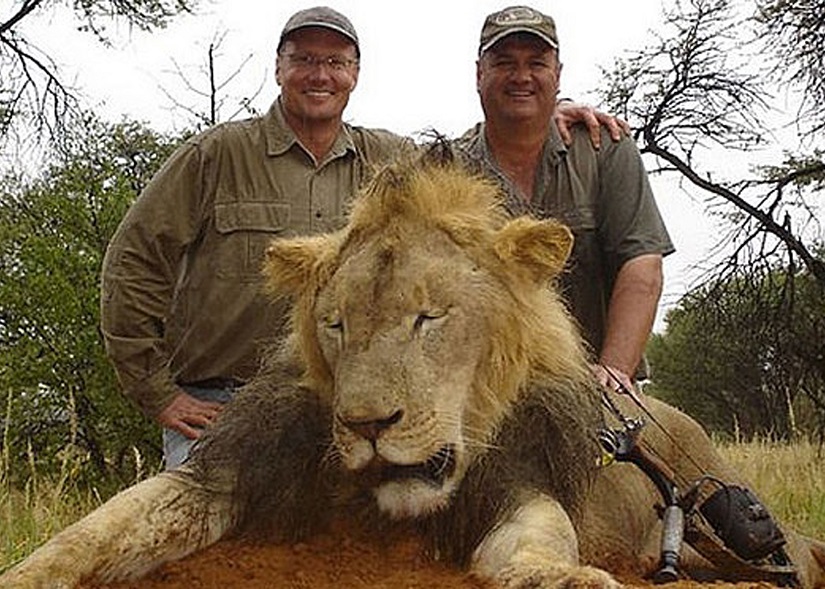
While plenty have flippantly asked why Cecil's death in particular has drawn such ire when hundreds of lions have been killed recently in Zimbabwe alone, there's nothing inherently wrong with taking one notable case as a starting point for asking questions about a wider issue. Just as we mourn family members and friends but not every single other human death on the planet, it is unrealistic to expect identical outpourings of grief towards animals of whom we have no direct understanding or knowledge, even if many share the concern over plummeting wildlife population numbers. The fact Cecil had a name and was beloved among those who knew him is indeed important, because it reminds us that if even this special lion can be so heartlessly butchered, what chance do the rest of them have?
Similarly, it is a false equivalence to ask why Cecil's death matters after he led a relatively long and free life when mistreatment of animals in the Western world is so prevalent, particularly when it comes to such practices as battery farming the animals producing the food which ends up on supermarket shelves. Animal welfare in all areas of life undeniably needs to be put under much greater scrutiny, but as shocking as Cecil's extended suffering prior to his death was, it was the exception rather than the rule for an industry which values 'clean' kills, if only for the hunter's pride and the inconvenience of having to track a wounded creature for hours and days afterwards to collect the trophy. The difference between battery farming and hunting is that, for its undeniable horrors, battery farming ultimately serves a purpose in creating food. Hunting means killing an animal for no other discernable reason than the hunter's personal pride.
The real issues arise from the resulting online outrage. Few would argue with the anger and grief which followed Cecil's death, but the form it has taken and the aims it has persued are considerably more problematic. The internet's lynch mob tendencies when it comes to online shaming has a profoundly negative track record when it comes to debating and reasoning out difficult issues. This can be attributed to the tendency for any voices dissenting from the consensus to be immediately shouted down, if not turned into a target themselves. It is morality by echo chamber, where right and wrong are absolutes and cruelty and injustice are called out not to improve the lives of others or make a fairer, more ethically sound world, but as a statement of one's virtue and for the approval of likeminded peers. It is a dangerous precedent which corrupts concepts of truth and free speech.

Consider the renewed calls for trophy hunting to be banned. On the face of it, this is an easy case to make: no living being should be destroyed for the sake of another's ego. The easiness of the target unfortunately means that any attempt to introduce complexity into the debate is roundly ignored, even condemned. In isolation, hunting is a deeply unpleasant practice. Paradoxically, it may also represent the best chance for many of the animals in question to be saved from extinction. There's no question that many of the benefits of hunting, as stated by its most ardent supporters, are grossly overblown. A 2013 study, for instance, revealed that little of the money generated by the industry ended up helping local communities in any meaningful way. Equally, the regulations in place to control the quotas of hunted animals is notoriously lax, while illegal hunting, as Cecil's case demonstrates, is rife. The dwindling numbers of many of the most prized trophy animals only further proves how horrendously mismanaged the whole situation continues to be.
The wrinkle is that hunting is far from being the only threat to these animals' survival. Less malicious, but arguably vastly more dangerous, is the ballooning human population growth in Africa, increasingly infringing on wildlife hunting grounds and consuming many of the resources they rely on to survive. This in turn leads to a rise in the number of animal attacks on humans, causing the animals to be hunted down either for retribution or as a guarantee of safety. An increase in population also means an increase in farming, requiring extensive grazing ground and only further eating into the territory where wildlife is able to sustainably survive. In Asia, the increased affluence of nations like China and Vietnam means demand for ivory and animal bone used in traditional medicines or as status symbols has skyrocketed, proportionately increasing their poaching value in relation to how stringently their trade is controlled or outlawed. That is to say nothing of the dangers of climate change, pollution and countless other factors: you can read more about those at the WWF website.
With corruption and mismanagement endemic in the systems supposed to protect the most vulnerable animals, it is no surprise that increasingly affluent and powerful poachers are coming up with more grotesquely innovative and technologically advanced methods of securing their prizes with every passing year. The sad truth is that humanity will inevitably kill off anything which does not have tangible value in being kept alive. For that reason, a properly regulated hunting industry may indeed play an instrumental role in one day guaranteeing the survival of certain species. If there is money to be made in breeding these animals to fund a profitable industry, even one revolving around their eventual deaths, humanity will find a way. If their survival relies on nothing more than sentiment, current and historical form suggests extinction is surely guaranteed.
Hunting is a deeply unpleasant practice, but to ban it outright may ultimately prove destructive in view of greater but less easily morally quantifiable threats to animal survival elsewhere. This is not to suggest that there may not be alternatives - this article for the New Yorker details how Rwanda has revived its gorilla population through ecotourist permits - but that relying on reactionary judgments rather than careful reasoning is not the way to find them. Hunting will almost certainly continue to exist, one way or the other. As despicable as its brutality is, it seems preferable to me that the human desire to kill animals be at least controlled and channelled in a productive and responsible way, even if we're a long way from that point right now, rather than being left solely to poachers and profiteers.
A concluding note for those who have participated in the witch hunt for Cecil's murderer, Walter Palmer. As Jimmy Fallon, of all people, very correctly pointed out, Palmer's conviction, or as some social media extremists childishly demand, death, ultimately achieves nothing. Yes, he should be held accountable for his crimes, but while focusing so much rage and attention on one man may satisfy one's personal thirst for vengeance and receive plenty of likes and retweets in the online echo chambers, it will neither bring Cecil back to life or help protect the countless other animals destined to be slaughtered as a result of illegal hunting and poaching. If anything, it merely proves that the motives of those calling for his death for their personal satisfaction are no better than those of the man himself. True justice is not taking an eye for an eye. Palmer turning Cecil into a trophy does not justify seeking to turn Palmer into one. Instead, to quote Fallon again, honour Cecil by making good from the tragedy of his death. Debate and donate. Don't blindly hate.
Series Recap - Mission: Impossible - Ghost Protocol (2011)
After Mission: Impossible 3's straight-faced, character-driven approach made a messy attempt at returning the series to the first movie's cereberal roots, Ghost Protocol seems a natural companion piece to Mission: Impossible II. For one thing, Ethan's hair has grown long again, while the movie adopts the same all bombast, all the time style which John Woo made so intolerable through endless empty flourishes and Robert Towne's lousy screenplay. If M:I3 was a lesser imitiation of the original, though, Ghost Protocol director Brad Bird takes the philosophy of M:I II and makes the movie that movie should have been. There's no nonsense about Scottish doppelgangers, disquisitions about heroes and villains or ridiculous showboating here. Instead, the fourth entry in the series has nothing more on its mind than delivering two hours of relentless entertainment. It succeeds admirably.
Perhaps the most telling difference between this and M:I II is that where Woo's movie came across as an extended Tom Cruise ego trip, Ghost Protocol delights in how much physical damage it can inflict on its star. Bird turns Hunt into Wile E. Coyote, a figure whose absence of personality matters not in the slightest when the real pleasure is watching him get pulverised on a semi-regular basis. This in turn makes him quite a bit more likeable than the two previous movies, if only because his sheer persistence in the face of constant physical trauma becomes amusingly, morbidly admirable. Rarely has even the boldest action movie climax been so unashamedly Looney Tunes-esque as the ridiculous showdown in a high-tech car park, culminating in Hunt driving a car down a straight drop of several floors to the concrete ground.
The plot is so thin as to barely exist. The IMF team is framed and disavowed following the destruction of the Kremlin, for which responsibility lies with Kurt Hendricks, a man determined to start a nuclear war for reasons no-one can entirely fathom. Hendricks barely appears at all, to the extent I'd mostly forgotten there even was a main villain for most of the movie's running time. Bird uses plot as little more than a loose framework around which to build a set-piece delivery machine, churning out one action sequence after another with little interest in developing the narrative in any meaningful way. Where that might be problematic in lesser hands, Bird shoots each sequence with such freewheeling energy that it's a joy just to be taken along for the ride. Making his live action directorial debut off the back of Pixar's The Incredibles and Ratatouille, there's a clear cartoonish influence on the way he gleefully abandons reality in search of squeezing every drop of entertainment and comedy value out of each frame.
The Burj Khalifa sequence, the apex of the series' love of vertical action, is the most thrilling of the lot and among the most astounding movie set-pieces of the decade so far. Benefiting enormously from Cruise's devotion to performing every stunt himself, Bird delights in evoking the vertiginous heights Hunt is manoeuvering above. Having Hunt climb the side of the world's tallest building isn't enough, of course, so the movie throws in a number of terrific visual gags surrounding his malfunctioning adhesive gloves and a variant on the fulcrum technique used for a skyscraper break-in in the last movie, here employed in an insane attempt at returning to the hotel room from whence he came and naturally faceplanting a window on the way. Anyone who missed seeing it in IMAX should be kicking themselves, but it is shot so well as to work almost as effectively on the small screen. After the overblown blue-and-oranges of M:I3, Robert Elswit's cinematography puts a strong emphasis on bringing out the colour and vibrancy of each location. Ghost Protocol is frequently gorgeous to look at and captures the distinctive identity of each destination in a way Woo and Abrams so comprehensively failed at.
What anchors the movie is the strongest team dynamic of the series to date. Simon Pegg returns from M:I3 and is given far greater prominence as the movie's comic relief gadget maestro. With Ving Rhames' stalwart Luther held back until a cameo at the end, Jeremy Renner and Paula Patton are the newcomers making up the rest of the team. Renner is wonderful as Brandt, a grumpier, more reluctant version of the Ethan Hunt from the first movie and something approaching a voice of sanity in a world gone utterly bananas. His chemistry with Pegg and Cruise is immediately endearing, even if his links to Hunt's past feel a little shoehorned in. Paula Patton's Jane Carter gets a slither of backstory, immediately making her the series' best developed female character. While Patton isn't an especially strong actress, she looks believeable tough - her kicking off her heels before going into battle is a small, badass wonder - and rocks a cocktail dress to brain-melting levels of hotness.
The movie's approach to continuity is interesting, although not altogether successful. The reveal that Brandt was on the security detail assigned to protect Hunt's wife, Julie, when she was ostensibly killed just sort of sits there, serving little purpose until a faintly sweet coda in the final scene. The question of what actually happened to her is brought up a number of times and drags the pace down each time. I appreciate the movie not simply ignoring its predecessor's potentially difficult resolution, but a shorter, sharper explanation would have been more than sufficient. A callback to the manner in which Hunt is taken to see Max in the first movie is a fun if nonsensical nod, but can't help but feel disappointing when the imperious Vanessa Redgrave fails to turn up. That Hunt instead turns out to be making a call to the man he freed from a Russian prison (to the tune of 'Ain't That A Kick In The Head', no less) in the first act pays off that foreshadowing reasonably well, but if you're going to tease one of the series' most vivid characters, you'd damn well better deliver. Much better is how the movie's final line is used to slyly set up the events of Rogue Nation, which will have a hell of a job on its hands if it's to raise the bar on Ghost Protocol's stupendous action extravaganza.
Series Recap - Mission: Impossible 3 (2006)
Following the widely-derided Mission: Impossible 2, the series remained dormant for a full six years before JJ Abrams, then best known for his work on TV spy series Alias, was brought onboard to try and resurrect it. Star Tom Cruise was also in need of a vehicle to win back his place in the heart of moviegoers, having undergone a series of PR disasters after unceremoniously firing his agent in 2004. Despite still being a draw at the box-office, with such successes as Minority Report, The Last Samurai and War Of The Worlds under his belt, his star's public persona was seen as increasingly alienating, with his close support of Scientology becoming ever more pronounced.
There's a clear sense in Mission: Impossible 3 of drawing back from the garish excesses of the second movie to something more intimate and character-driven. Having recently married Katie Holmes and with a child on the way, one suspects that public cynicism regarding the authenticity of Cruise's family life may have played some part in the direction that M:I3 was taken. That may give you some clue as to how well it turned out.
Anyone familiar with Alias will immediately recognise why Abrams was brought onto the movie. The plot bears a number of resemblances to motifs employed repeatedly throughout the series, most notably opening in media res and featuring a protagonist struggling to keep his professional life as a spy separate from his personal life. Following his escapades spanking Dougray Scott around in Australia, Ethan Hunt is, in fact, no longer an active field agent but an instructor. His protégé, Lindsey Farris (Keri Russell, playing against type), is kidnapped while investigating an arms dealer, Owen Davian, who is trying to get his hands on a mysterious weapon known as the Rabbit's Foot. Hunt has also found himself something approaching a steady home life, though his fiancée, Julie (Michelle Monaghan), is entirely unaware that his real job is considerably less mundane than the post she believes he's holding down at the Department of Transportation.
If that's seems like a lot of backstory to get through before the plot even begins, you'd be right. The movie starts with the series' most powerful cold open, in which Davian holds a gun to Julie's head and threatens to kill her if Hunt doesn't tell him the location of the Rabbit's Foot by the time he's finished counting down from ten. This short sequence packs in a huge amount of information without betraying the intensity of the scene. While gripped by the sight of the normally cool-headed Hunt descend into pleading desperation as each of his negotiating tactics fail miserably, we're subconsciously absorbing small details (Hunt having someone extremely close to him under threat, the value of the Rabbit's Foot, Hoffman as the villain, etc) to be expanded upon later.
Unfortunately the effortless power of that opening scene doesn't expand to the rest of the film. The plot is heavily streamlined in order to keep things moving, which wouldn't be so bad were so much essential information not left missing or underdeveloped. We have no idea how Hunt and Julia met or why they're attracted to each other beyond physical appearance, or even who they really are as people. Knowing so little about the two characters makes investing in their relationship a real mission: impossible (badum tish) as neither is given the slightest bit of depth either individually or as a couple. Monaghan's natural sweetness almost pulls it off on her end, but Cruise has never seemed more robotic or unnatural. The scene in which Hunt throws a party to meet Julie's family shows him descending into outright creepiness, as he starts reading people's lips and injecting himself into their conversations. As mentioned previously, playing romance has never been Cruise's strong point and the straight-faced nature of his scenes with Monaghan make the uncanny valley of his performance as Likeable Human Male all the more pronounced.
The spy stuff is more interesting by default, but still feels strangely hollow. The heavy use of colour grading in any scene set in an urban or industrial environment overemphasizes the blues and oranges to such an extent that the movie often has the look of a particularly offputting DVD cover. Abrams' direction is acceptable, but while it's a relief not to endure any more of Woo's tiresome flourishes, his inexperience on film is painfully obvious. He shoots with the technical precision required on television, but fails to establish any sense of grandeur. The entire movie feels like a (remarkably expensive) feature-length series finale, only becoming truly cinematic in the terrific sequence in which Hunt's convoy, carrying the captive Damian, is assaulted by air while crossing the Chesapeake Bay Bridge-Tunnel. The narrative streamlining also makes it difficult to invest in the plot, as keeping the nature of the Rabbit's Foot secret means there's no sense of the scale of the threat in question. Simon Pegg's Benji postulates a theory about it being the anti-God, but the suggestion is so over-the-top, and immediately dismissed by the character himself, as to be nothing more than empty hyperbole. The intention is obviously to keep the focus on the personal stakes for Hunt after Julie is kidnapped, an admirable goal which flounders due to that relationship being similarly underwritten.
What does work is Philip Seymour Hoffman's performance as Davian. Rather than going full-on with boorish villain theatrics, Hoffman takes an unexpected road by imbuing Davian with a chilling, sociopathic stillness. He may not be the most physically dangerous antagonist Hunt has faced, but he's aware that the morality restricting the actions of Hunt's team makes him effectively invincible. His calmness is a sinister reflection of his absolute confidence and amorality, making him a grippingly atypical foe for the genre. Also fun is the set-piece in which Hunt breaks into the Vatican, which features a number of strong visual gags (and a mesmerising effect in which Hunt's Hoffman mask seemlessly transforms him into Hoffman) and an interesting location missing from the factory/skyscraper infiltrations which make up two of the movie's other major set-pieces. It's just a shame Hunt's team suffers the depth deficiency which diminishes all the movie's major characters, though there's at least a genuine sense of friendship between Hunt and his three-time partner Luther (Ving Rhames), while Maggie Q is just natural enough in her performance as Zhen Li not to disappear as thoroughly as Jonathan Rhys Meyers' Declan, who is notably solely for his terrible Irish accent.
The movie rediscovers its verve a little for the Shanghai-based climax, but even then struggles to elevate itself to heights above forgettable adequacy. True, that's a huge step-up from M:I II, but hardly the sort of recommendation needed to revive a series struggling for relevancy in the wake of the hugely successful Jason Bourne movies and Daniel Craig's soon-to-be-lauded debut as James Bond in Casino Royale. Fortunately, the fourth entry in the series, Ghost Protocol, would find in Brad Bird a director capable of marshalling the series' disparate tones into something more enjoyable and distinctly its own. Check back tomorrow for the final entry in our series recap.
Series Recap - Mission: Impossible 2 (2000)
While Brian De Palma's Mission: Impossible was a financial and criticial success, questions about its hard-to-follow plot were seemingly taken to heart when producers Tom Cruise and Paula Wagner sought to redirect the sequel away from the original's atmospheric blend of summer blockbuster and old-school action thriller and into more unashamedly spectacular action territory. The hot action director at the time was John Woo, coming off the back off a number of successful American ventures after establishing his name with the likes of The Killer and Hard Target in his native Hong Kong.
The kindest thing that can be said about Mission: Impossible 2 is that it's sort of interesting for being a movie which bears virtually no resemblance at all, in plot, characters, tone or visuals, to its predecessor. Cruise's character may be once again called Ethan Hunt, but to all intents and purposes, the protagonists of the two films manage to be completely different men despite both being largely blank slates in terms of personality. Woo's melodramatic style, matching heightened action with ludicrously hammy symbolism and near-abusive quantities of slow motion, certainly has its lurid charms when expressed in full, self-mocking regalia - see the wonderfully barmy Face/Off - but is made instantly insufferable by being used as a misguided tool to enhance the cool factor of its star.
Every frame of Mission: Impossible 2 reeks of pandering to megastar Cruise's ego. Woo's camera is never shy of zooming in at just the right time to remind the audience of the actor's toughness, rebelliousness, sensitivity, or just for one more look at that sexy, sexy Tomface. Having been more intellectual than fighter in the previous movie, Hunt grew his hair into an Aaron Carter mop in the interim and realised thinking was for dorks. After all, why strain the ol' brain when the possibility exists to instead thump someone in the face with a flying kick, or engage in a little motorbike foreplay with the Scottish doppelganger with whom you share a girlfriend? To describe the movie as substance-free is an insult to things which don't exist. It's so monumentally vapid and self-involved that it makes existing things want to disappear until it's all over.
The small moments of irony which do sneak through are among the movie's most enjoyable, although that's not saying much. It could be suggested that Woo was trying parody a certain kind of overwrought, star-driver blockbuster, but even if true, the few moments in which the satire registers are greatly outweighed by its extensive pandering to that same formula. Villain Sean Ambrose, played with all the toughness of a wet flannel by Dougray Scott, is supposed to be the anti-Ethan, but Ethan himself is such a non-entity that Ambrose himself just comes across as a preening, petulant pronk. His two moments of success both come in mocking Ethan, once describing how the hardest part of imitating him - more on that in a moment - was having to "grin incessantly for fifteen minutes" (more a jab at Cruise than Hunt) and later in contrasting his own 'kill first, think later' approach with Hunt's eagerness to perform "some aerobatic insanity before [risking] a single hair on a guard's head". It's worth noting that this is the first movie in which Hunt is shown performing anything like aerobatics, and while he was undeniably something of a pacifist in the first movie, here his approach is every bit as driven by guns and fists (steady) as Ambrose.
Leaving aside Scott's flaccid performance, what little sense of danger Ambrose might have possessed is dissipated the moment he's shown to be so blindly lovestruck by his ex-girlfriend, Nyah, that he willingly invites her into his lair despite it being such an obvious trap that he himself notes the contrivance of the whole scenario. The risk doesn't matter, he explains to his bodyguard, Stamp (played by Richard Roxburgh), because he knows she's a snitch and will get rid once he's bored of having sex with her. If that doesn't sound like an altogether honourable way of handling a female character, it's as good as it gets for poor Thandie Newton. The first scene positions Nyah as a master thief, only for those skills (bar one instance of straightforward pickpocketing) to be consciously discarded in favour of making her the rope in a tug of war between hero and villain over who gets to have sex with her. Like many 'strong female characters', she does all the sassy posturing supposedly proving her an equal to the menfolk - although if that were true, she wouldn't be required to prove it - only for the narrative to reduce her to a brainless plaything for Scott and Cruise, whose career-long inability to convincingly play romance is emphasized to a painful degree here with such clunking lines as "My God, you're beautiful". I do like her name though - Srta Nyah Nordoff-Hall - so that's something.
Let's also talk about the face masks, a fun little gimmick in the first movie but used incessantly here. The plot starts off with Ambrose 'doubling', needlessly, for Hunt, then continues in that vein throughout, with everyone seemingly having a mask of everyone else just in case it happens to come in handy. Yes, it's supposed to emphasize Ambrose and Hunt being the same person on opposite ends of the moral compass - much like the pathogen and antidote making up the movie's Macguffin and described by Dr. Nekhorvich, their Einstein-y creator, as villain and hero - but such symbolism doesn't follow through when you have Hunt imitating Nekhorvich and Stamp as well. What's that supposed to symbolise? Instead it functions as lazy shorthand to engineer some decidedly unshocking twists into a plot which could not be more rote if it tried: Ambrose wants to loose the Chimera virus on Sydney to increase the value of the shares he owns in the company manufacturing the antidote.
Sydney also makes a resoundingly dull location, having so little identity on-screen that the best settings the movie can muster up are a racetrack, a skyscraper and a bunker, with a remote sheep farm thrown in for good measure. The city dominates the movie's running time, but there's so little sign of any local history, unique architecture or culture that a very brief excursion through Seville offers infinitely more flavour in a tiny fraction of the time. It's a hollow location for a thoroughly hollow movie, a stark contrast in every way to its complex, compelling predecessor. Action movies don't need to be intelligent or even make a great deal of sense, but do need to offer something more than an excuse for the star to posture and prance about the place trying to remind everyone of what a badass he thinks he is, even when the embarrassing transparency of the act is immediately apparent to everyone forced to endure it.
It's no surprise M:I II (yes, that's the official abbreviation) marked the start of a downturn in Cruise's career, to the extent that when the series' second sequel was released a full six years later, his deteriorating public image was seen to have a negative impact on the movie's marketing. Check back here for my coverage of that movie tomorrow.

